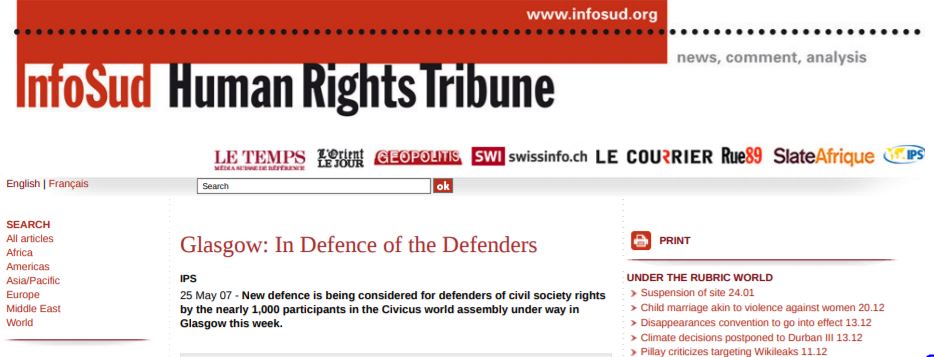|
25 May 07 – New defence is being considered for defenders of civil society rights by the nearly 1,000 participants in the Civicus world assembly under way in Glasgow this week.
|
Sanjay Suri/IPS, Glasgow – Members of Civicus, the Johannesburg-based international civil society alliance, and of other non-governmental organisations are debating whether to support a proposal for a new declaration on defence of the rights of civil society campaigners.
There is much defending to do. “Many civil society members and organisations speak out, often critically of the government,” Clare Doube from Civicus told IPS. “We are very concerned about the leaders and activists of civil society organisations who have been threatened, arrested, killed.”
A recent instance, she said, was the “attacks on lawyers defending activists in Zimbabwe.” The Civicus meet is drawing particular attention to two Ethiopians jailed for joining a peaceful demonstration to support the fight against poverty.
The two Ethiopians, Daniel Bekele and Netsanet Demissie, are both coordinators of the Global Call to Action against Poverty (GCAP) campaign. Netsanet heads the Organisation for Social Justice in Ethiopia, and Daniel is manager at ActionAid International Ethiopia. Both were detained in November 2005.
The opening plenary of the Civicus world assembly set aside two chairs on stage with a photograph of each on a chair to remind members of the dangers civil society members face when they speak out. A cage at the assembly site in which volunteers spent some time made a theatrical point of the risk. But a debate lingers whether civil society should do something particular about the unique threats to activists.
Bekele and Demissie were jailed for speaking of the rights of others. Civicus is drawing attention to more such cases: Chen Guangcheng, sentenced to more than four years imprisonment in China last year for supporting villagers in suing authorities over a campaign of forced sterilisations and abortions; and women jailed in Iran for protesting against gender discriminatory laws.
Civicus is campaigning for indigenous peoples leader Diego Arcos Meneses arrested in Mexico Feb. 17 this year; for Raquel Castro of the Teachers Association of Arauca in Colombia, detained since August 2005; for Mutabar Tadjibayeva, chairperson of the human rights monitoring group “Fiery Hearts Club” in Uzbekistan, sentenced last year to eight years in prison. “And all this is only the tip of the iceberg,” said Doube.
“We are exploring ways to better protect civil society organisations and activists,” she said. One proposal is to set up a charter for civil society rights. “There is no document at present that specifically deals with these issues.” Existing declarations, she said, “do not look at the rights that civil society activists hold collectively.”
Organisations like Amnesty International and Human Rights Watch are doing great work, but they have a broad remit, Doube said. “We are looking at the space within which civil society functions. We are looking at their right for assembly and association, and then finding a voice for it.”
A civil society rights charter could also put groups in different areas in a stronger position to deal with governments, Doube said.
But other activists are not convinced about the need for a new rights charter for civil society. “A United Nations declaration on human rights defenders adopted in 1998 covers this need,” Mary Lawlor from the Dublin-based group Front Line told IPS. “That sets out the right to defend others individually and in association with others.”
Front Line focuses on supporting individuals engaged in the defence of the rights of others. “It could be anyone, depending on their activity at the time,” said Lawlor. “Journalists, trade unionists, lawyers, human rights NGOs.”
The group sets up secure communication channels with defenders in need, and lobbies on their behalf. In nine cases it has arranged for immediate transfer of endangered defenders to another country. It maintains a round the clock emergency number operated in five languages. The group is keener on specific services like this, rather than a new charter.
A new charter was first proposed in 2004. But it has come under more active consideration since the recent attacks on civil society members, and is being debated at length at the Civicus meet under way in Glasgow. (END/2007)


